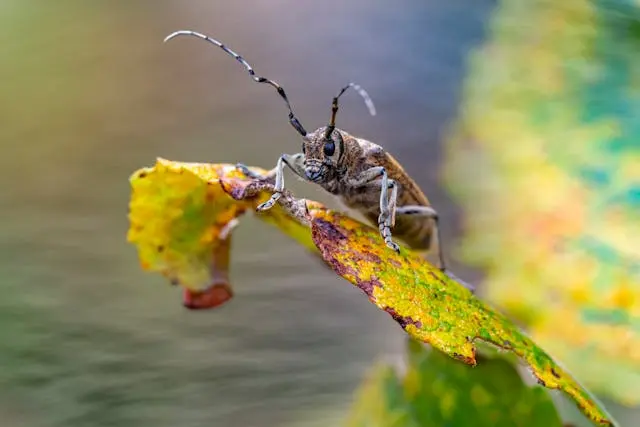
by n.trelease@creativeserum.com | Aug 26, 2025 | Pests
If you’re a homeowner or property manager who just noticed tiny holes in wooden furniture or trees, you might be dealing with borers. If left alone, these wood-boring beetles and their larvae can cause serious damage to the wooden structure.
But you can’t control an infestation when you’re not 100% sure what’s behind it.
If you’re still unsure, we’ll help you find out what borers look like and how to spot them before the damage spreads in this post. Let’s break it down.
What Do Borers Look Like?
Borers aren’t always easy to spot.
Adult borers are typically beetles, ranging from small (a few millimetres) to larger (several centimetres) and can be various colours.
They usually begin as larvae, hidden inside timber or tree bark. When larvae hatch, they feed on the inner wood, weakening it from within. By the time adult beetles emerge through exit holes, significant damage may already be done.
Physical Appearance of Borers
Again, spotting borers isn’t always straightforward. Most people only notice the damage long after larvae hatch inside timber or trees. Knowing what these pests actually look like is the first step to protecting your home and garden.
Wood Borers
Wood borers include species like the common furniture beetle, powderpost beetles, and the European house borer.
They vary in size but are usually small, brown to black beetles, between 2mm and 7mm long. The female common furniture beetle lays eggs inside cracks of untreated timber, and larvae can live inside for up to four years before emerging as adult beetles.
Tree Borers
Tree borers, such as eucalyptus borers and longhorn beetles, are larger and more colourful. Some, like jewel beetles, have metallic sheens. The adult Queensland pine beetle is dark brown, about 15mm long, and infests hoop pine sapwood.
The larvae are cream-coloured grubs that tunnel deep into tree trunks and branches.
Signs of Borer Infestation
Borer activity leaves clear evidence if you know what to look for. The most common sign is small exit holes in affected timber, usually 1–2mm in diameter for furniture beetles, and up to 10mm for longicorn beetles.
Infested wood may also crumble easily, leaving fine wood powder near wooden structures or furniture. In trees, you may notice wilting leaves, oozing sap, or dieback in branches.
What Do Tree Borers Look Like in Australia?
Tree borers are often mistaken for other beetles.
Jewel beetles, for example, have metallic bodies and can be green, blue, or copper. Longhorn beetles are easily identified by their long antennae, sometimes longer than their own bodies.
Their larvae bore through live wood, leaving tunnels that compromise the tree’s strength and health.
Common Tree Borers in Australia
Citrus tree borers are one of the most destructive to backyard fruit trees. They lay eggs under bark, and the larvae hatch and feed on living wood, causing dieback.
Eucalyptus borers, such as Phoracantha semipunctata, are notorious across South Australia, especially in stressed or drought-affected gums.
Eucalyptus borers have spread widely in Western Australia and continue to threaten native trees.
Damage Caused by Borers in Homes and Gardens
Borers don’t just nibble at wood. They weaken trees, furniture, and even building timbers. Let’s look at how they affect both gardens and homes:
In Trees
Borer attack weakens trunks and branches, making them prone to splitting.
Severe infestations can kill mature citrus or eucalyptus trees within a few seasons. This loss affects the shade and fruit yield but also property value.
In Wooden Structures
Inside homes, borers target untreated timbers. Common furniture beetle damage often appears in wooden furniture, floorboards, and roof timbers.
Lesser auger beetle infestations weaken hoop pine and other softwoods. An old house borer infestation can threaten the structural integrity of entire buildings.
How to Treat and Prevent Borer Infestations
Once you’ve spotted borer activity, the next step is treatment. Different methods work for different situations, whether it’s a tree in your garden or timber inside your home.
Inspection and Identification
Start with a careful inspection.
Look for exit holes, wood powder, or weakened areas. Identifying the species is critical. Some infestations from the likes of the European house borer require different treatment than powderpost beetles when feeding in hardwood timbers.
Treatment Options
For furniture and wooden structures, wood borer treatment may include insecticide sprays or timber preservatives that penetrate deep into infested wood.
Severe infestations may require fumigation or heat treatment to kill hidden larvae. For trees, pruning affected branches, improving tree health, and applying surface treatments are effective.
Some metallic wood boring beetles can be managed by keeping trees watered and fertilised to reduce stress.
Prevention Methods
Prevention saves far more than treatment. And it starts from the choice of wood during furniture-making.
Always use kiln-dried or treated timbers when building or repairing. Avoid storing infested wood indoors. Regularly check wooden furniture and outdoor structures for new exit holes.
Keep trees healthy with proper watering, as stressed eucalyptus or citrus trees are more vulnerable to borer attack.
When to Call a Professional Pest Control Service
DIY methods rarely solve deep borer infestations. If you notice ongoing borer activity, widespread borer holes, or furniture beetle damage spreading across your home, it’s time to call in experts.
At Allstate Pest Control, we provide borer treatments across Adelaide, backed by decades of experience and 24/7 availability. Early action prevents expensive repairs and helps protect your property long-term. Call us today on (08) 8371 1277.
Frequently Asked Questions
How do I know if I have a borer infestation?
Look for exit holes, piles of fine wood powder, and weakening in wooden furniture or structures. In trees, symptoms include sap bleeding, leaf wilting, and branch dieback.
Are tree borers dangerous to my trees?
Yes. Severe infestations from species like citrus tree borer or eucalyptus borer can kill entire trees within a few seasons, especially if the tree is already stressed.
Can borers spread from one piece of timber to another?
Yes. Adult beetles leave infested wood through exit holes and lay new beetle eggs in nearby untreated timber. This is why a borer infestation can quickly spread across wooden furniture, floorboards, or roof timbers if not treated early.
For fast, reliable borer treatment anywhere in Adelaide, call Allstate Pest Control today on (08) 8371 1277. For quick enquiries, send us a message.
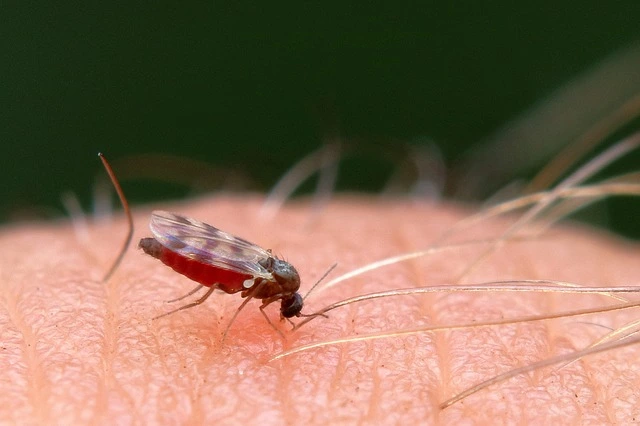
by n.trelease@creativeserum.com | Aug 26, 2025 | Fly
Homeowners and renters across Adelaide know how frustrating midges can be in house corners. You sit down after a long day, and instead of peace, you’re swatting tiny flying insects that leave itchy bites and disrupt your sleep.
For families in coastal areas or homes with damp spots, biting midges are a nuisance and constant irritation. So, how do you manage midges in the house?
It starts with identifying what attracts them: moisture, light, and organic matter, and then optionally implementing the right pest control steps with the help of a pest control service like Allstate Pest Control.
Midges are small flying and biting insects. They belong to the same order as mosquitoes and gnats. But they’re much smaller. Yet, some midge species are known to be far worse than mosquitoes!
However, many species are harmless, feeding on plants and decaying matter. Others, like biting midges, feed on exposed skin and can leave painful, itchy welts.
They’re commonly found around water sources such as wetlands, rivers, and coastal areas.
According to the Government of Western Australia, biting midges are most active at dawn and dusk, particularly in humid weather and calm conditions. While they don’t spread diseases in Australia, their bites can cause discomfort, allergic reactions, and disturbed sleep.
What Attracts Midges in the House?
Midges don’t wander indoors by chance. They’re drawn by several factors:
Moisture is a big one! Damp areas in bathrooms, kitchens, and laundry rooms provide the perfect breeding ground for larvae.
Light is another attractant. Adult midges often swarm around bright indoor lamps, especially at night when windows or doors are left open.
Standing water also plays a role. Buckets, pet bowls, or trays under pot plants can become breeding sites where eggs hatch.
Lastly, organic matter. Food scraps, decaying fruit, or damp soil in potted plants can keep midge activity high indoors.
How to Get Rid of Midges in the House
You don’t have to live with them. Here’s how you can reduce or stop an infestation.
• Start by removing standing water: Empty pet bowls daily and tip out water sources like plant saucers.
• Use fly screens: Properly fitted screens help keep out midges, mosquitoes, and other flying insects.
• Clean on a regular basis: Wipe kitchen benches, take out bins quickly, and avoid leaving fruit exposed.
• Try natural options: Bowls of apple cider vinegar mixed with dish soap can act as simple traps for gnats and midges.
• Set up traps near windows or light sources: These can catch adult midges attracted to brightness.
• Use insecticides carefully: Sprays designed for flying insects can reduce adult populations, but should be applied with care.
And importantly, call a biting insect control professional. At Allstate Pest Control, our insect control service in Adelaide provides personalised solutions, safe treatments, and long-term preventative measures.
Preventing Future Midge Problems
Prevention works better than constant treatment. Here’s how to protect your home and family from future midge problems:
1. Seal entry points around windows, doors, and vents to keep adult midges outside.
2. Maintain outdoor areas. Keep lawns trimmed, remove rotting vegetation, and clear drains of stagnant water.
3. Stick to regular cleaning indoors. Wash bins often, wipe spills quickly, and check pot plants for damp soil.
Simple preventative measures like these cut down breeding opportunities and reduce the chance of large numbers settling in your home.
Why Choose Allstate Pest Control for Midge Infestations in Adelaide?
We know midges. With decades of local experience, we understand South Australia’s climate, pests, and problem spots better than anyone else.
Our services cover all biting insects, from mosquitoes to gnats and bees & wasps, ensuring your home or business is protected year-round. We also use eco-friendly options where possible; they are designed to protect humans, pets, and the environment.
Most importantly, we also help identify breeding grounds, reduce future risks, and give you back peace of mind.
Frequently Asked Questions
What attracts midges to my house?
Midges are mainly drawn to light, moisture, and organic matter. In Adelaide, they often gather around bathroom drains, damp laundry areas, or pot plant soil. Biting midges breed in wet sand, mud, or decaying vegetation, making homes near coastal areas or wetlands more vulnerable. Even a bowl of fruit left out overnight can attract large numbers of insects indoors.
How can I prevent midges from coming into my house?
Installing fine mesh fly screens with gaps smaller than 1mm can physically block midges, as their bodies are tiny (often less than 3mm). Regularly emptying water sources like pot plant saucers or pet bowls is crucial, since eggs and larvae develop in damp environments. Cleaning bins with boiling water and sealing food reduces breeding opportunities inside.
Are midge bites harmful?
Biting midges don’t transmit diseases in Australia, but their bites can be extremely irritating. The saliva they inject causes an allergic reaction in most people, leading to itchy red welts that may last for days. For those with allergies, scratching can break the skin and increase the risk of secondary infection.
Take Back Your Home from Midges
Dealing with midges is not only frustrating. It disrupts sleep, comfort, and everyday living. You don’t need to put up with them.
If you’ve noticed biting midges in house corners, or swarms of tiny flies near lights, it’s time to act. Call Allstate Pest Control today on (08) 8371 1277 for fast, reliable support across Adelaide.
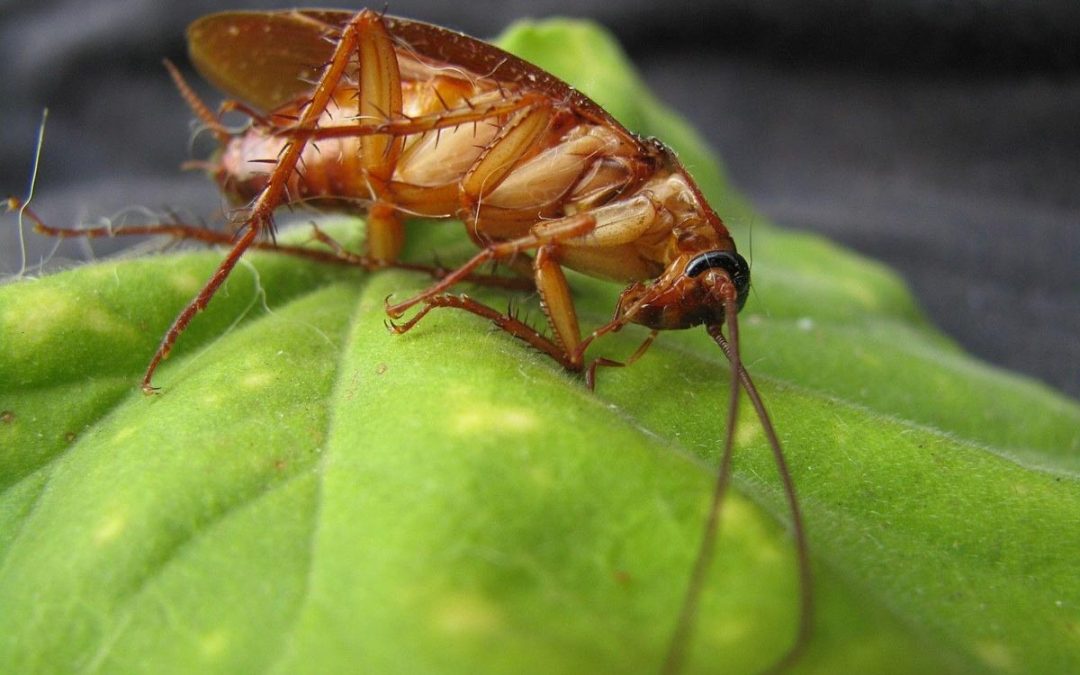
by n.trelease@creativeserum.com | Aug 15, 2025 | Blog, Cockroach
If there’s food, moisture and warmth, you’ve got the perfect recipe for a cockroach outbreak! But why do cockroaches suddenly appear in homes that seem clean and sealed? The answer lies in their habits and survival instincts.
Find out why cockroaches suddenly appear and how you can stop these sneaky pests from venturing inside your home in today’s Hivemind blog.
What questions will this article answer?
[slide-anything id="348976"]
Why do cockroaches suddenly appear in my house out of nowhere?
Many people wonder why cockroaches suddenly appear despite keeping a tidy home, but when conditions are right, they can move in quickly. Although they are nocturnal creatures, if you’re spotting cockroaches scurrying around during the day, this means that there are plenty of them hidden away out of sight!
With their small size, flattened shape and fast legs, cockroaches can seem to appear and disappear just as quickly.
Once inside your home, they’ll find a dark, enclosed and warm place to hide out of sight, usually right near a water source. Check under your sink, fridge, washing machine or dishwasher, tucked into drawers and cupboards, or even under furniture – places that you never would have thought to look!
Once they find a suitable nesting spot, they’ll start breeding and laying eggs, and after a few short months, you could find yourself caught in the midst of a full-blown cockroach outbreak.
Although they are considered to be omnivores, cockroaches are not fussy when it comes to scavenging food. While they will eat plants and other insects outside, a hungry roach will happily devour almost anything inside your home.
They enjoy meat and carbohydrate-rich sweet, sugary and starchy treats, but will also eat paper-based products such as stamps and cardboard boxes, as well as adhesives used for book binding and wallpaper. In fact, they might even tuck into your leather furniture, soap or even your toothpaste!
With six tiny legs, it’s a wonder that cockroaches can move as fast as they do – around 1.5m per second! It does help that they have a flattened, oval body shape to improve aerodynamics. Some species can even fly, making them even harder to catch.
Being small and lightweight makes many species of cockroaches quite agile. Most cockroaches grow to around half an inch long, but some species such as the American cockroach, can grow over 2 inches in size.
Protect your home from cockroaches, get expert advice today
 or
or
This explains one of the most common reasons why cockroaches suddenly appear, especially in warm Adelaide homes. The ideal temperature for cockroaches to thrive is between 20-30 degrees Celsius, making their peak season occur between spring and summer. The warmer conditions will accelerate the reproductive cycle and development of cockroach eggs, causing a spike in the cockroach population.
However, in the cooler seasons, cockroaches will also be attracted by the heat and shelter inside your home and find a cozy spot to nest, with some species even entering a hibernation-like state.
There’s plenty of moisture around
Although they can go for long periods without food, cockroaches must have ample amounts of moisture to survive, or they risk dehydrating. That’s why they tend to thrive most in areas which are warm and humid. It speeds up their metabolism, development and breeding cycle. Without a source of moisture, it’s believed that cockroaches will only be able to survive for around one week.
So if you’re wondering why cockroaches suddenly appear in the house after rain or during humid days, moisture could be the culprit.
How to keep cockroaches away
If you’ve ever asked yourself why cockroaches suddenly appear in your house, prevention is key. You can make your home less appealing for cockroaches by taking the following simple steps:
Keep your home clean
A messy and cluttered space invites a whole range of pests inside, including cockroaches. We recommend regularly cleaning and disinfecting floors, kitchen appliances and surfaces, particularly in dining and food preparation areas. Decluttering can also reduce the number of hiding spots for cockroaches to nest and lay eggs.
Seal off potential access points inside
With the ability to crawl inside the smallest and tightest of spaces, you’ll want to carefully inspect your home for tiny holes or gaps that could allow for cockroaches to slip inside, and then cover or fill them with waterproof sealants.
Store food away
Cockroaches will enjoy feasting from food in your kitchen as much as you do, so you’ll want to make sure that you keep it stored away in sturdy containers, out of sight, either in the fridge or pantry. This includes pet food and water bowls.
Proper waste management
With unhygienic foraging habits, cockroaches are known to search through rubbish and waste looking for their next meal. You’ll want to make sure that you use sturdy plastic bags to store your rubbish, and check that your rubbish bins have tightly fitted lids. Avoid keeping piles of compost out in the open.
Fix leaking plumbing
Requiring moisture to survive, cockroaches are clever at seeking out sources of water. Check your plumbing system regularly for leaks and fix them as soon as you can. This includes drains, toilets, pipes, gutters and taps, as well as appliances such as washing machines and dishwashers, which connect to your plumbing system.
Cockroaches in your kitchen? Get fast advice today
 or
or
Professional cockroach control
At Allstate, we find that a tailored approach works best against cockroach outbreaks, particularly if preventative measures haven’t been successful. After identifying the species and locating the nest, we’ll often use a combination of the following treatments to target the problem:
Residual sprays
Containing insect growth regulator pesticides, aerosol sprays can be applied to larger infested areas as well as around the perimeter of your home to act as a protective barrier.
Bait stations
For areas with a large amount of cockroach traffic, we can install tamper-proof bait stations containing insecticide.
Control dust
To encourage sneaky cockroaches to venture out from hard-to-reach hiding places, we’ll sprinkle insecticide control dust, which can penetrate even the tiniest of gaps, cracks and crevices.
Fumigation
Effective for severe outbreaks, we can apply a concentrated insecticide gas to a sealed off cockroach hotspot. We’ll be sure to let you know when it’s safe to re-enter the space.
Heat treatment
As a more environmentally friendly and pesticide-free approach against severe cockroach infestations, applying a dry heat treatment to a sealed-off area is also effective for destroying cockroach eggs as well as sterilisation.
For effective and reliable cockroach management, choose Allstate
For most people, when cockroaches suddenly appear in the house, it can feel like a huge shock. Although this means that a cockroach nest is most likely nearby, you don’t need to panic. Allstate Pest Control is just a phone call away.
Since 1986, we’ve successfully combatted cockroach outbreaks in all suburbs of Adelaide. Whether you’re in a commercial, residential or industrial setting, our team of highly trained pest control technicians is available 24/7 with accurate advice and a range of innovative treatments to safeguard your home or business against even the most persistent cockroaches.
With competitive warranties and payment plans applicable to all our services, you can have long-lasting cockroach protection sooner rather than later.
Our expert team is ready to help you now
 or
or
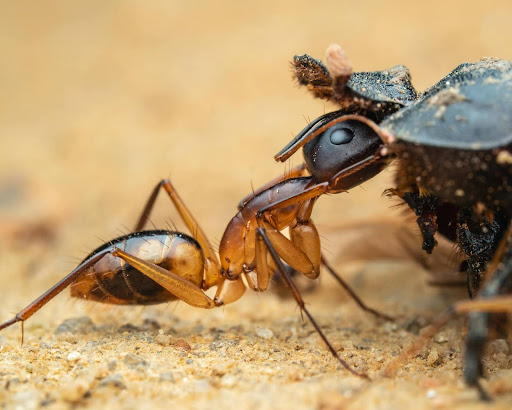
by n.trelease@creativeserum.com | Aug 15, 2025 | Ants, Blog
For some ants, it’s a few short weeks. For others, it’s decades! If you’ve ever wondered how long ants live for in Australia, we’re sharing some fascinating insights into the life cycle for the top 8 pest ant species in today’s Hivemind blog.
In this guide, we’ll answer the question how long ants live, exploring Australian species and how their lifespans affect pest control.
What questions will this article answer?
[slide-anything id="348939"]
How long do ants live for: the typical ant life cycle
Fun fact: you’ll find up to millions of ants living together in a nest! They are very organised creatures, with each adult ant belonging to a caste and having a specific job to ensure the survival of the colony. These castes include queen, worker, soldier and drone ants.
Queen ants are responsible for laying eggs to increase the population. These eggs hatch as translucent white larva, which look like grubs. Eventually, the larva will grow and evolve into a more mature pupa, often (but not always) by spinning a cocoon to complete its development before finally emerging as an adult.
The ant life cycle can be influenced by the species, needs of the colony as well as environmental conditions such as temperature and humidity.
Understanding these stages helps explain how long ants live in different environments.
Arguably the most common household ant, black garden ants will eat almost anything, from sweets, to meat and even rotten food. They usually grow 2.5-3mm long and have glossy black colouring.
Worker ants typically increase in size over many generations in more well-established colonies, and live between 1-2 years.
Queens can be up to 15mm long, live up to 15 years, and lay eggs which will normally hatch after 6 weeks.
As their name suggests, bull ants are big and aggressive, with venomous stings that pack a punch. They grow between 8-40mm in size, and are black in colour with splashes of bright red or orange on their heads or abdomen.
Once a queen has laid eggs, they may take up to several months to develop into adults, and workers can go on to live for over 2 years.
Stop ants in their tracks – get fast advice today.
 or
or
As their name suggests, fire ants are a copper-brown colour and have powerful stings. They are considered as highly invasive and become very defensive if provoked.
They can grow between 2-6mm in length, and you’ll find different sizes within the same colony. Queens live for up to 7 years, and can lay between 2,000 and 5,000 eggs per day.
Workers have a shorter lifespan – they’ll usually live for a few weeks to months at best.
Notorious for releasing a rotten coconut smell when crushed, odorous house ants are active throughout the year, and colonies often inhabit multiple nests, each with tens of thousands of workers. They’re usually brown or dark grey in colour, and between 2 and 3mm long.
So, how long do ants live when it comes to odorous house ants? Queens and workers can live for 2-3 years.
Odorous house ant adults normally take 5-11 weeks in total to develop from the egg stage, but this process can take up to 7 months depending on the season.
An introduced and highly invasive species, a single colony of Argentine ants can infest vast spaces covering several hectares, making outbreaks challenging to treat and reinfestations quite common.
Light to dark brown in colour, and growing 1.5-3mm long, queens can live for several years, and workers between 10-12 months. Each colony may have multiple queens who can lay up to 60 eggs each day, with eggs taking 2-3 months to develop into adults.
Protect your family from ant bites, speak to an expert today
 or
or
With the ability to relocate their nests and start a new one from the ground up if they feel threatened, Pharaoh ant infestations have a reputation for being hard to control, with baiting techniques usually preferred over surface sprays.
They’re often found nesting in warm areas such as wall voids containing electrical conduits, hot water plumbing and heating ducts.
They have distinct yellow to amber colouring and red/black stripes on their abdomens, and grow up to 2mm long.
Each colony will have multiple queens, each living between 4-12 months. Male pharaoh ants live for only 3-5 weeks after mating.
Depending on humidity and temperature, the egg to adult life cycle will take around 38-45 days. Adult workers have a short life span of around 9-10 weeks.
As their name suggests, ghost ants can be hard to see with their small size and milky-white, translucent appearance. They grow between 1.3-2.5mm long, move rapidly, and like odorous house ants, can also emit a rotten coconut odour when crushed.
Queens can live for up to 15 years, and workers’ lifespan ranges from a few months to a year. Eggs take 2 to 4 weeks to hatch into larvae, with adults emerging after a further 2 months.
Not to be mistaken for termites, carpenter ants prefer tunnelling into moist, decaying wood such as old tree stumps and logs rather than timber in your home. However, do watch out for them if you have windowsills, eaves, roofs and doors that are exposed to moisture. They’ll leave behind small piles of sawdust.
Carpenter ants can be identified by their black, orange or brown bodies and grow between 2.5-14mm long.
It normally takes 3 to 6 years to establish a colony, and queens can live up to 25 years. Workers normally live for around 12 months. Adults will normally take between 6 and 12 weeks to fully develop from the egg stage, but low temperatures can slow this right down to around 10 months.
Don’t let an ant outbreak ruin your summer. We’ll help you plan ahead.
 or
or
How to prevent ants at home
Knowing how long ants live and how colonies grow over time makes prevention even more important.
Take the following simple steps to protect your home from marching ants:
- Seal off potential entry points including holes and cracks in walls, gaps under doors and around windows
- Avoid leaving food out, including pet food. Instead, keep it stored away in sturdy containers and packaging
- Keep your kitchen and dining areas tidy and clean by wiping away food spills and crumbs and disinfecting cooking and cleaning surfaces as well as floors
- Practice proper waste disposal and management by making sure that bins are not overflowing and all rubbish is stored in well-sealed plastic bags and bins with lids; secure piles of compost
- Fix leaking taps, drains and pipes to reduce moisture
- Reduce hiding spots and food sources in your yard by removing rotten fruit and vegetables, pet waste, and piles of leaves and vegetation
- Keep tree branches and bushes trimmed away from the building
At Allstate, our pest technicians are trained to identify common pest ant species and understand how their behaviour can impact the type of treatments we use to stop an outbreak.
Because how long ants live can affect treatment strategies, we customise our approach based on their life cycle. We’ll start off by conducting a thorough inspection of all entry points and potential nesting sites, then apply the following treatments either directly to the nest itself or in active areas:
Surface spray
Airborne insecticide sprays can be applied around building perimeters and disperse over large spaces, offering a fast treatment for large areas. They’re also able to penetrate hard to reach, enclosed spaces, such as ant nest tunnels and tiny entry points such as cracks and holes.
Control dust
With its fine consistency, ant control dust can also be sprinkled directly into small access points. This includes gaps, into ant nest openings, as well as roof spaces and even your fuse box.
Ant baits
Tamper proof ant baits can be used to lure in ants, who carry the insecticide back to the rest of the colony. Although this method can take longer to control an outbreak, it can be tailored to target the specific pest ant species, eventually preventing the ant colony once and for all.
For long-lasting and reliable ant management, choose Allstate
Ant outbreaks can get out of control fast, so it’s best to avoid being on the back foot if you start seeing them marching into your home.
At Allstate, we’re available 24/7 to all suburbs of Adelaide for managing ant outbreaks in commercial, industrial and residential settings since 1986. Our highly trained team is fully equipped to successfully treat all ant infestations no matter the species or location of their nests.
With payment plan options and competitive warranties on all our services, you won’t need to worry about getting bitten by an army of ants invading your kitchen anytime soon.
Our expert team is ready to help you now
 or
or
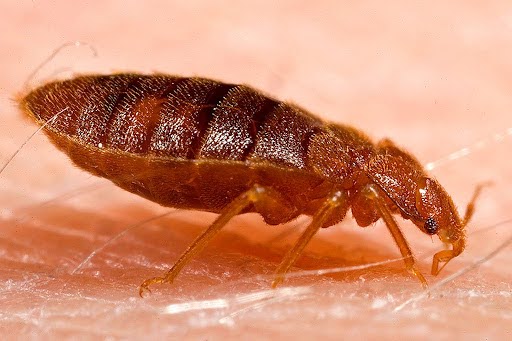
by n.trelease@creativeserum.com | Jul 31, 2025 | Bed Bug
So, how do you treat bed bug bites?
Start by washing the affected skin with soap and water. Apply a cold compress. Use an anti-itch cream or calamine lotion. And avoid scratching, no matter how tempting.
If the bites worsen or signs of infection appear (which is rare), speak to your doctor. Some cases may need antihistamines or prescription creams.
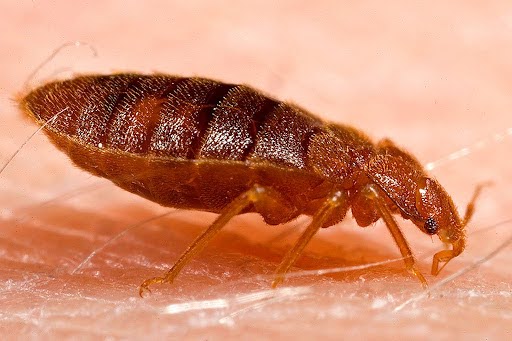
At Allstate Pest Control, we’ve helped thousands of South Australians manage bed bug problems and infestations for over 35 years. We’re here to guide you, step by step, through relief, remedies, and long-term prevention.
Let’s walk you through what to do.
What Do Bed Bug Bites Look Like?
Bed bug bites usually appear as red, raised welts. You’ll often find them in clusters or lines on exposed skin of the arms, legs, neck, or back.
Unlike spider bites, they don’t swell up immediately. They can take hours or even days to show. And once they do? The itching kicks in.
The bite marks can become inflamed, especially if you scratch at them. On brown skin, bites may appear as darkened or purple spots rather than red.
What makes things tricky is that not everyone reacts the same way. Some people experience severe itching or even an allergic reaction. Others barely notice the bites at all.
Bed Bug Bites: How to Treat
- First step: clean the area. Gently wash the bite marks with soap and lukewarm water. This helps prevent skin infections and soothes the itch somewhat.
- Apply a cold compress. It reduces swelling and numbs the itch. Don’t scratch, it spreads bacteria and delays healing.
- Next, use an over-the-counter cream or gel like calamine lotion or hydrocortisone. These reduce inflammation and provide relief from severe itching.
- If the bites are widespread or you’re having a stronger reaction, speak to your GP or pharmacist. They may recommend an oral antihistamine or prescription topical cream.
Home Remedies for Bed Bug Bites: Quick Relief Tips
Got no creams on hand? No worries.
Here’s how to treat bed bug bites with what’s already in your kitchen or medicine cabinet.
Topical treatments for itching and swelling
- Aloe vera gel: Straight from the plant or a natural gel. Soothes, hydrates, and promotes healing.
- Tea tree oil: A few drops diluted in water or carrier oil help with itching and have antibacterial properties.
- Baking soda paste: Mix with a few drops of water and dab it on. Leave for 15 minutes, then rinse.
- Toothpaste: Surprisingly effective. The menthol provides a cooling effect and reduces irritation, but avoid using it on broken skin.
When to seek medical help for bed bug bites
Get medical advice if:
- You develop a fever.
- The bite area feels warm, hard, or has pus (signs of infection).
- You experience an allergic reaction, such as swelling of the face or trouble breathing.
Also see a GP if the bites aren’t healing after a few weeks or you’re constantly being bitten at home. That’s likely an ongoing bed bug infestation, not just a one-time problem.
How to Prevent Bed Bug Bites in the Future
The real problem isn’t the bites but the bugs.
To prevent bed bug bites, you need to eliminate bedbugs or avoid them in the first place.
Here’s what helps:
- Avoid secondhand furniture, especially mattresses, bed frames, and upholstered items, without a pest check.
- Vacuum carpets, beds, and soft furnishings on a weekly basis. Pay extra attention to mattress seams and box springs.
- Use bed bug-proof covers on mattresses and pillows.
- Inspect your hotel room before unpacking. Pull back the bed sheets. Look at the seams. Check for tiny insects or black stains.
Worried you’ve picked them up during travel? Then, put all clothes and bags in a hot wash and dry cycle on the highest setting when you return.
Expert Bed Bug Removal Services from Allstate Pest Control
Treating bites is just the beginning. The only way to truly stop bed bug bites is to remove the bed bugs.
Allstate Pest Control offers safe, professional treatments tailored to your situation. Our licensed technicians inspect all possible hiding spots, from mattress seams and skirting boards to wardrobes and loose wallpaper.
We don’t rush the job. Our goal is to control bedbugs safely with targeted surface pesticide treatments, steam, or heat methods, depending on what your space needs.
We discreetly and effectively treat homes, hotels, aged care facilities, and student housing.
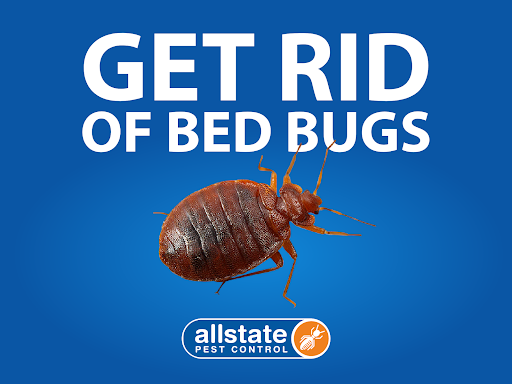
Contact Allstate Pest Control for Professional Bed Bug Treatments
Think you’ve been bitten? Seeing signs of a bed bug infestation at home or work?
Call Allstate Pest Control today on 08 8371 1277. We’re South Australia’s most trusted pest control company, available 24/7 for inspections and fast treatment plans. We’ll help you sleep easy again.
Frequently Asked Questions
What is the fastest way to heal bed bug bites?
The fastest way to treat bed bug bites is to wash the affected area with mild soap and water, apply calamine lotion or an antihistamine cream, and avoid scratching. Cold compresses help reduce swelling. Otherwise, leave the bite site alone. Most bites will heal on their own in a week or so.
How long does it take for bed bug bites to go away?
Bed bug bites usually heal in 7 to 14 days, or less. It depends on your skin type and whether you scratch. For some individuals, the itching can persist for several weeks.
What does toothpaste do for bed bug bites?
Toothpaste contains menthol and other cooling agents that can temporarily relieve itching. It’s not a medical treatment but can work in a pinch.
How do you stop bed bug bites from spreading?
You stop the spread by controlling the bed bug infestation. Regular cleaning, vacuuming, and professional pest control treatments are key. Bites themselves don’t spread, but repeated bites will occur until the bugs are removed.
Can bed bug bites cause serious problems if not treated?
In rare cases, untreated bed bug bites can lead to skin infections or allergic reactions. Sleep deprivation and stress are also common effects of ongoing infestations.
Need fast help with bed bug bites or a suspected bedbug infestation? Leave us a message or call Allstate Pest on (08) 8371 1277 today.










